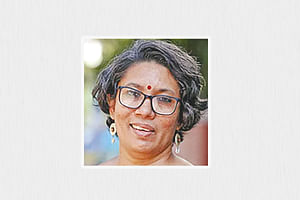In the wake of the quota reform movement in government jobs, which began in public universities and later spread to private universities, Dr. Samina Lutfah, Associate Professor of Sociology at Dhaka University, shares her insights with Prothom Alo about student participation, the university situation at the time, and the steps that should be taken now. The interview was conducted by Monjurul Islam. Considering the importance of the interview, we have translated it for our reders.
Prothom Alo: The quota reform movement in government jobs was primarily centered around universities. The movement was peaceful until attacks on students at Dhaka University sparked violence. Clashes ensued, police and BGB were deployed, and students were forced to leave their dormitories. How do you view these events? What is your assessment of the university administration’s role?
Samina Lutfah: The quota reform activists of 2024 were well-organized and peaceful from the start. Their movement gained momentum from the first week of July. On July 14, in response to a statement made by the Prime Minister at a press conference, students expressed their anger through a slogan, which was quickly altered. The government attempted to criminalize the movement, finding an opportunity in this incident.
Following this, Chhatra League attacked peaceful student protesters on campuses with sticks and rods, injuring many students. Subsequently, Chhatra League leaders who had been controlling various university halls were ousted.
University administrations closed universities indefinitely, acting on an illegal and unauthorized directive from the University Grants Commission, passed through their syndicates. Police, RAB, and BGB used tear gas and sound grenades to forcibly evict students from their halls by evening. Students who left the halls were immediately targeted by waiting thugs and subjected to abuse.
University administrators (Vice Chancellors, Proctors, Provosts) failed completely in ensuring student safety or providing a safe exit from campuses. They are responsible for the damage to Chhatra League rooms as they had long delegated responsibilities (like hall management) that should have been under faculty control to Chhatra League leaders.
University administrators should have resigned on July 17 out of shame. In contrast, the administration of private universities exhibited true teacher-like behavior, standing as shields for their students, which is commendable and praiseworthy.
Prothom Alo: Reports indicate that around 200 people have been killed, and thousands injured during these protests. Even with police, RAB, and BGB deployment, the situation was uncontrollable, necessitating the imposition of a curfew and deployment of the army. How do you interpret the overall situation?
Samina Lutfah: Typically, authoritarian governments use state machinery and their various branches to completely suppress any movement, fearing that any protest could topple them. Over the past seven days, we have only seen attempts to crush political opposition. The death toll is still being counted, thousands of protesters are being detained under harassing charges, injured students are leaving hospitals out of fear, and coordinators of the movement are being abducted and tortured.
We are shocked, stunned, and outraged by videos showing shootings from helicopters, firing on unarmed protesters, shooting injured people at close range, executing civilians on the streets, and ensuring the death of a young man hanging from a building under construction by repeatedly shooting him.
This is not a state of war; civilians were protesting. The use of such force to suppress a movement is unprecedented. The United Nations has expressed anger, and expatriate Bangladeshis and global citizens have condemned this massacre.
Prothom Alo: This movement has attracted not just job seekers but other social classes as well. As a sociologist, how do you view this movement? Does it indicate any changes in our state, politics, or society?
Samina Lutfah: The 2024 quota reform movement can be termed a ‘backlash’ protest in sociological terms, which has evolved into a mass uprising. After three questionable elections and more than 15 years in power, the government, along with Chhatra League, police, BGB, and RAB, used excessive and illegal force. Even with a curfew and army deployment, this movement could not be suppressed.
Internet blackouts, block raids, mass arrests, and harassment occurred. Yet, public protests continue. The movement has turned into a mass uprising that has shaken the global conscience.
Prothom Alo: Allegations of violence, sabotage, and destruction of state property have been made, leading to cases being filed. Thousands have been arrested in recent days, with many taken into remand, including university students. What do you think will be the outcome of these actions?
Samina Lutfah: The short-sightedness and reckless actions of this government have caused permanent damage to Bangladesh’s economic, diplomatic, and political image globally, with profound and long-lasting effects. The government’s attempt to observe state mourning over the bodies of hundreds of its citizens is a horrific farce, which the students have rejected.
The unity of students and citizens against every lie, farce, and PR campaign of the state forces is being felt by ordinary citizens. But does the government feel it? If they do, they must cease oppression, and pursue peace, apologize for their lies, and move towards fair investigations and justice, upholding humanity. Otherwise, they will lose the trust of this generation forever. The movement is no longer limited to quota reform but now demands justice for the ‘July Massacre.’










